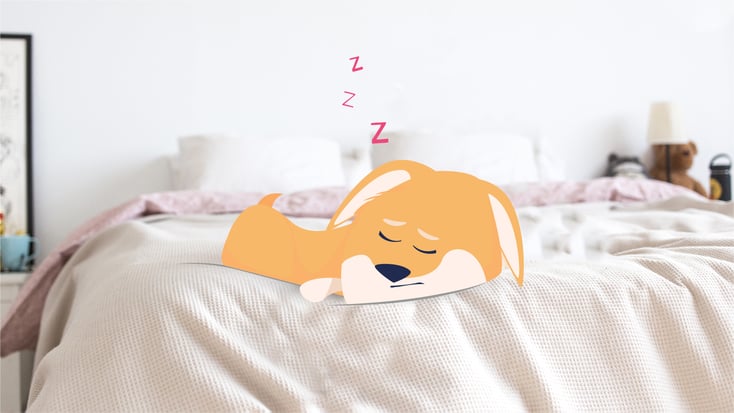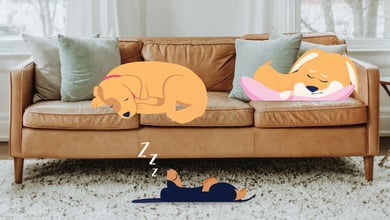Why Do Dogs Sleep So Much? A Vet's Answer

Ever watched your furry friend curled up, eyes closed, and wondered, 'Why does my dog sleep so much?' If you've found yourself pondering this question, you're not alone.
Dogs indeed sleep more than us humans, and there's a fascinating science behind it. So, let's explore the world of canine sleep, debunk myths, and unravel your dog's dreamy mysteries.
Key Takeaways:
- Dogs sleep on average about 12 to 14 hours per day, while puppies and older dogs might sleep for 18 to 20 hours per day.
- The amount of sleep depends on factors such as age, breed, health, activity level, and diet.
- It's only a cause for concern if your dog has a sudden change in sleeping patterns, lethargic when awake, or displays changes in behavior.
How Long Do Dogs Sleep Per Day?
On average, dogs sleep about 12 to 14 hours per day. This can vary based on factors such as the dog's age, breed, health, and activity level. Puppies and older dogs tend to sleep more, often up to 18-20 hours a day. Active working dogs or dogs in good health might sleep less.
So, a dog will sleep for about half of every day on average, but why is that?
Why Do Dogs Sleep So Much?
Compared to humans, dogs sleep more due to several factors: life stage, breed, health status, activity level, and diet. This sleep allows for growth in puppies, energy conservation in working dogs, and recuperation in older or unwell dogs.
These are the 5 most common reasons your dog sleeps so much:
1. Age
Puppies and older dogs tend to sleep more. Puppies expend a lot of energy growing and exploring their surroundings, while older dogs may tire more easily.
2. Breed
The breed of a dog can also affect their sleep patterns. Larger breeds, such as Saint Bernards and Mastiffs, are known to sleep more than smaller breeds.
3. Health
Health issues can affect a dog's sleep. Dogs with medical conditions or who are recovering from illness or surgery may sleep more than healthy dogs.
4. Activity Levels
A dog's daily activity level plays a role in how much they sleep. Working dogs may sleep less, while dogs with lower activity levels may sleep more.
5. Diet
Diet can affect a dog's energy levels. A diet lacking proper nutrients can lead to a dog feeling tired and needing more sleep.
It's always good to monitor your dog's sleep habits to ensure they are within a healthy range. Significant changes in sleep patterns can indicate health issues and should be addressed with a veterinarian.
When to Worry About Your Dog Sleeping Too Much
While dogs do sleep more than humans, there are times when excessive sleep may signal a problem.
If you notice any of the following signs, it may be time to consult a veterinarian:
-
Sudden change in sleep pattern: If your dog suddenly starts sleeping much more or less than usual, it could indicate an issue.
-
Lack of energy when awake: If your dog is lethargic during their awake hours and not showing interest in activities they usually enjoy, this could be a cause for concern.
-
Other behavioral or physical changes: Changes in appetite, unexplained weight loss or gain, signs of discomfort, or abnormal behavior can accompany changes in sleep patterns and indicate health problems.
As a pet owner, you know your dog best. If something doesn't seem right with your dog's sleeping pattern, seek veterinary advice.
Frequently Asked Questions
Is it normal for my dog to sleep all day?
Yes, it's perfectly normal for dogs to sleep a lot, often 12 to 14 hours a day. Factors such as your dog's age, breed, and health can influence this. Puppies and older dogs may sleep up to 18-20 hours, which can seem like "all day".
Do dogs get bored sleeping all day?
Dogs, unlike humans, don't typically get bored from sleeping. Their sleep patterns are different, with multiple sleep-wake cycles throughout the day and night. However, it's important for dogs to have enough physical and mental stimulation when they are awake. Long periods of inactivity could lead to boredom or anxiety. Providing toys, engaging in playtime, and regular walks can ensure your dog stays happy and stimulated.
Do dogs dream while sleeping?
Yes, dogs do dream while sleeping. Similar to humans, dogs enter a deep sleep stage called the Rapid Eye Movement (REM) phase, which is often associated with dreaming. You might notice your dog twitching, whimpering, or moving their paws during sleep, suggesting they're dreaming. These dreams might be related to their daily experiences, like chasing a ball or interacting with their human family.
Why do dogs circle before lying down?
Dogs circle before lying down due to an instinctive behavior inherited from their wild ancestors. Circling the spot where they plan to rest served several purposes: flattening grass or snow to make a comfortable bed, driving away any small critters hiding within, and checking the spot for safety. Even though domesticated dogs have cozy beds, this ancestral trait persists. It's a normal dog behavior unless it becomes excessive or obsessive, in which case, you should consult a vet.
What does it mean if my dog snores?
Dog snoring can be common and usually isn't a cause for concern. Like humans, dogs can snore for a variety of reasons. Common factors include sleeping position, obesity, certain breeds with shorter noses (like Bulldogs or Pugs), allergies, or blocked airways. However, if your dog's snoring is unusually loud, happens every time they sleep, or they're having difficulty breathing, it's best to consult a vet. This could signal a health issue such as sleep apnea or a respiratory condition.
Summing Up a Dog's Sleep Cycle
In summary, the world of canine sleep is a fascinating one. Dogs, unlike humans, have different sleep patterns and requirements, often sleeping more than half the day.
Whether it's due to their age, breed, health status, or just a well-earned nap after an energetic play session, your dog's sleep patterns are an essential part of their overall wellbeing.
As a dog owner, understanding these patterns is key to ensuring your four-legged friend stays healthy and happy. But remember, any significant changes or concerns about your dog's sleep should always be discussed with your vet.






